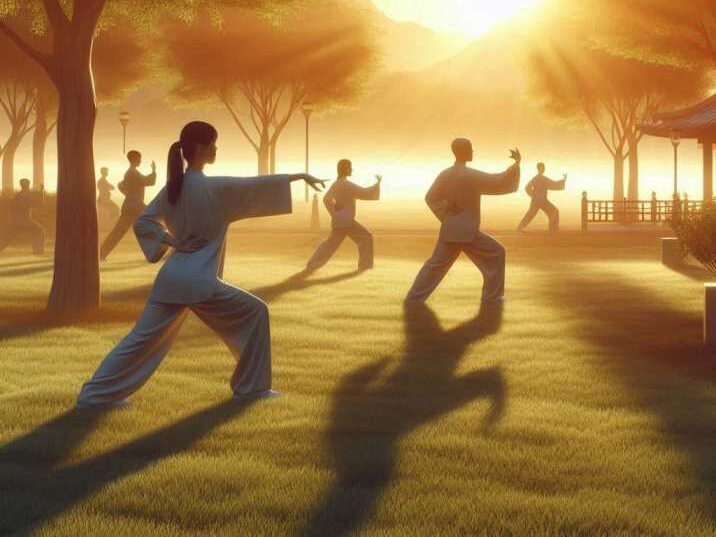Tai Chi and Qi Gong are two popular practices from ancient China, often associated with relaxation, health, and wellness. While they seem similar, they have distinct purposes and methods. Both require concentration, discipline, and practice, which can improve focus in school, work, and other activities. Let’s explore their differences and how they can benefit your life.
Introduction: A Journey into Ancient Practices
Table of Contents
In today’s fast-paced world, people are turning to ancient practices to improve their mental and physical well-being. Tai Chi and Qi Gong stand out as effective practices for reducing stress and boosting overall health. Though they share roots in Chinese culture, they have unique characteristics that make them suitable for different goals.
Understanding Tai Chi
What is Tai Chi?
Tai Chi, also known as Tai Chi Chuan, is a gentle form of martial arts that combines slow, deliberate movements with deep breathing. Originally developed in ancient China as a self-defense technique, Tai Chi has evolved into a popular practice for enhancing balance and promoting relaxation. Unlike more intense forms of exercise, Tai Chi emphasizes smooth, flowing motions that are easy to follow, making it accessible to people of all ages. Practicing Tai Chi regularly can help improve overall health, reduce stress, and increase mental focus.

Key Characteristics of Tai Chi
Flowing Movements
Tai Chi is known for its flowing movements that are performed in a continuous, graceful sequence. Practitioners move smoothly from one posture to another, creating a dance-like routine that is both calming and engaging. These movements, often referred to as “forms,” require coordination and rhythm, helping to enhance body awareness and muscle control. The seamless transitions between poses mimic the natural flow of energy in the body, promoting a sense of harmony and balance.
Focus on Balance
One of the main focuses of Tai Chi is improving balance and posture. The slow, controlled movements help strengthen the muscles and joints, which is especially beneficial for maintaining physical stability. By regularly practicing Tai Chi, individuals can enhance their coordination and flexibility, reducing the risk of falls and injuries. This emphasis on balance not only supports physical health but also contributes to better mental stability, making it easier to stay focused and centered in daily activities.
Martial Arts Roots
Although Tai Chi is primarily practiced for health and relaxation today, it retains its martial arts roots. The movements and techniques were originally designed for self-defense, incorporating elements of strength, agility, and strategic thinking. This martial heritage adds a layer of depth to Tai Chi practice, encouraging practitioners to develop both physical and mental resilience. The discipline and focus required in Tai Chi are directly linked to its martial origins, fostering a sense of confidence and self-control.
Benefits of Tai Chi
Physical Strength
Tai Chi is an excellent way to build physical strength without the need for heavy equipment or intense workouts. The slow, deliberate movements engage various muscle groups, helping to tone and strengthen the body. Regular practice can improve flexibility, making it easier to move freely and perform everyday tasks with greater ease. Additionally, Tai Chi enhances joint mobility, which is particularly beneficial for older adults or those recovering from injuries. By promoting overall physical health, Tai Chi supports a more active and vibrant lifestyle.
Mental Clarity
Practicing Tai Chi requires a high level of mental focus and concentration, which can lead to improved mental clarity. As practitioners move through the forms, they must stay present and attentive, which helps to calm the mind and reduce mental clutter. This meditative aspect of Tai Chi encourages mindfulness, allowing individuals to better manage stress and maintain a positive outlook. Over time, the enhanced mental clarity gained from Tai Chi can improve decision-making, problem-solving, and overall cognitive function, making it easier to stay focused in school, work, and other activities.
Stress Relief
Tai Chi is highly effective for stress relief due to its combination of gentle movements and deep breathing techniques. The rhythmic motions help to relax the body, while the focus on breathing promotes a sense of calm and tranquillity. This dual approach can lower cortisol levels, the hormone associated with stress, reducing anxiety and improving mood. Regular Tai Chi practice also encourages a mind-body connection, helping individuals to release tension and cultivate inner peace. As a result, Tai Chi serves as a natural and holistic way to manage stress and enhance overall well-being.
Exploring Qi Gong
What is Qi Gong?
Qi Gong (pronounced “chee-gong”) is an ancient Chinese practice that translates to “energy work.” Rooted in Traditional Chinese Medicine (TCM), Qi Gong aims to cultivate and balance the life energy, or “qi”, within the body. This practice integrates gentle movements, controlled breathing, and focused intention to enhance physical and mental well-being. Often considered a healing art, Qi Gong is accessible to people of all ages and fitness levels, making it a versatile tool for improving overall health and harmony.

Key Characteristics of Qi Gong
Simple Movements
Qi Gong is known for its simple, repetitive movements, making it easy for beginners to learn and practice. These movements are typically slow and deliberate, focusing on promoting a smooth flow of energy throughout the body. Unlike more complex exercises, Qi Gong’s simplicity allows practitioners to concentrate on their breathing and energy flow without distraction. This accessibility makes it an excellent choice for individuals of all skill levels, from young learners to seniors seeking gentle physical activity.
Breathing Techniques
Deep, intentional breathing is a cornerstone of Qi Gong practice. Breathing patterns in Qi Gong are designed to align with the movements, encouraging relaxation and mindfulness. By practicing controlled breathing, individuals can enhance their lung capacity, improve oxygen circulation, and support their body’s natural healing processes. This focus on breathwork also helps calm the mind, reducing stress and fostering a deeper connection between the body and mind.
Healing Focus
Qi Gong is primarily practiced for its healing benefits, with the goal of restoring the body’s natural energy balance. According to Traditional Chinese Medicine, disruptions in the flow of qi can lead to illness or discomfort. Qi Gong exercises are designed to unblock and smooth the flow of energy, allowing the body to heal and function optimally. This makes Qi Gong a complementary practice for managing chronic conditions, reducing pain, and enhancing overall vitality.
Benefits of Qi Gong
Energy Balance
Qi Gong helps maintain the body’s energy balance by harmonizing the flow of qi through the meridians (energy pathways). Regular practice ensures that energy circulates freely, promoting better physical and mental health. By addressing imbalances before they lead to illness, Qi Gong serves as a proactive approach to wellness, helping practitioners feel more energized and in tune with their bodies.
Mindfulness
Qi Gong encourages mindfulness by integrating movement, breath, and focus. As practitioners follow the slow, repetitive motions, they are guided to stay present in the moment. This meditative aspect helps reduce stress, improve mental clarity, and foster a sense of inner peace. The emphasis on mindfulness also teaches individuals to respond more calmly to life’s challenges, enhancing emotional resilience over time.
Improved Immunity
Studies suggest that Qi Gong may boost the immune system by reducing stress and improving overall circulation. The gentle movements and deep breathing stimulate the body’s natural defense mechanisms, supporting better immune function. Additionally, Qi Gong promotes relaxation, which can lower cortisol levels and enhance the body’s ability to fight off illnesses. By incorporating Qi Gong into their routine, practitioners can strengthen their immune health and improve their resilience to disease.
Tai Chi vs. Qi Gong: Key Differences
1. Purpose and Origin
Tai Chi originated as a martial art designed for self-defense, emphasizing balance, precision, and mental discipline. Its roots in combat have evolved into a practice for health and meditation. On the other hand, Qi Gong was developed primarily as a healing art within Traditional Chinese Medicine to cultivate and balance the body’s energy flow, or qi. While Tai Chi is grounded in movement and defense, Qi Gong focuses more on inner healing and energy management.
2. Movements
Tai Chi features complex, choreographed forms that require practitioners to learn sequences of interconnected moves. These routines flow like a graceful dance, blending strength and precision. In contrast, Qi Gong employs simpler, repetitive movements that are easy to follow and emphasize relaxation and energy flow. While Tai Chi’s forms build physical skill and endurance, Qi Gong’s actions are more meditative and focused on internal balance.
3. Physical and Mental Focus
Tai Chi emphasizes physical strength, balance, and coordination, often improving posture and muscle tone through its dynamic movements. It challenges the body to maintain equilibrium while executing fluid sequences. Qi Gong, however, focuses on breathing and internal energy flow, cultivating a calm mind and harmonious qi. While Tai Chi is more physically demanding, Qi Gong prioritizes mindfulness and gentle energy alignment.
Similarities Between Tai Chi and Qi Gong
Deep Breathing
Both Tai Chi and Qi Gong integrate slow, intentional breathing, which helps improve oxygen flow and enhance relaxation. Breathing deeply in sync with movements anchors the mind, fostering a meditative state and promoting inner peace.
Relaxation
These practices are known for their ability to calm the mind and body, reducing stress and anxiety. Through rhythmic movements and focused breathing, both Tai Chi and Qi Gong encourage a sense of tranquility and emotional balance.
Health Benefits
Both practices offer numerous health benefits, such as lowering stress levels, improving focus, and promoting overall well-being. Regular practice can enhance mental clarity, strengthen the immune system, and support physical health, making them valuable tools for a healthier lifestyle.
How to Choose Between Tai Chi and Qi Gong
Ask Yourself:
- Do I want to focus on physical activity or energy healing?
- Am I looking for a structured workout (Tai Chi) or a simple relaxation routine (Qi Gong)?
- Do I enjoy learning martial art forms, or do I prefer calm meditation?
Table of Information
| Feature | Tai Chi | Qi Gong |
|---|---|---|
| Origin | Martial arts, ancient China | Traditional Chinese medicine |
| Purpose | Balance, self-defense, meditation | Healing, energy flow, relaxation |
| Movements | Flowing, choreographed sequences | Simpler, repetitive movements |
| Focus | Physical balance, strength, energy flow | Breathing, mindfulness, energy flow |
| Popular Benefits | Stress relief, flexibility, focus | Stress relief, healing, energy boost |

Conclusion
Both Tai Chi and Qi Gong are excellent practices for enhancing your health and focus. Tai Chi combines martial arts and meditation, while Qi Gong centers on energy flow and healing. No matter which one you choose, practicing regularly can bring balance, relaxation, and improved focus into your daily life.
FAQs
1. What is the main difference between Tai Chi and Qi Gong?
Tai Chi is a martial art focused on physical balance, while Qi Gong is a healing practice centered on energy flow.
2. Which is easier to learn, Tai Chi or Qi Gong?
Qi Gong is generally simpler and easier to learn due to its repetitive movements.
3. Can I practice both Tai Chi and Qi Gong?
Yes, many people practice both to enjoy the unique benefits of each.
4. How long does it take to see benefits?
With regular practice, benefits like reduced stress and improved focus can be seen in a few weeks.
5. Is Tai Chi or Qi Gong better for beginners?
Qi Gong is often better for beginners due to its simplicity.


